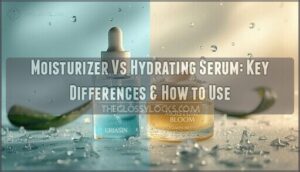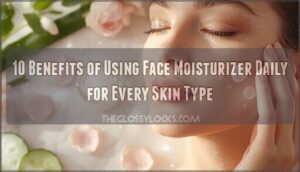This site is supported by our readers. We may earn a commission, at no cost to you, if you purchase through links.
Your skin was radiant for weeks—that coveted pregnancy glow everyone promised—and then seemingly overnight, your jawline erupted in painful cystic bumps that won’t budge with your usual spot treatments. You’re not imagining the sudden change: progesterone surges during pregnancy can increase sebum production by up to 30%, transforming previously clear skin into an unpredictable landscape of breakouts, especially during the first and second trimesters when hormonal swings peak.
The frustrating part? Most of your go-to acne fighters—retinoids, salicylic acid in high concentrations, certain prescription medications—are off-limits now that you’re growing a human. But pregnancy acne isn’t something you just have to endure until delivery.
Table Of Contents
- Key Takeaways
- Why Does Acne Occur During Pregnancy?
- When Does Pregnancy Acne Usually Appear?
- Safe Skincare Routines for Pregnancy
- Ingredients to Avoid for Pregnancy Acne
- Effective Ways to Prevent Pregnancy Acne
- Natural Remedies for Pregnancy Acne
- When to Seek Dermatologist Advice
- Frequently Asked Questions (FAQs)
- Can pregnancy-related acne breakouts be treated safely?
- What are the ways to avoid skin breakouts?
- How do you get rid of acne during pregnancy?
- How do I get rid of pregnancy breakouts?
- What causes acne during pregnancy?
- Are there any safe treatments?
- What natural remedies can I try?
- How should I adjust my skincare routine?
- What should I avoid doing?
- Can pregnancy acne predict the babys gender?
- Conclusion
Key Takeaways
- Pregnancy acne stems from hormonal surges that spike progesterone and androgens up to 70 percent higher than usual, flooding your pores with thick sebum and typically hitting hardest during the first trimester around weeks 6-12.
- Most conventional acne treatments—including retinoids, oral isotretinoin (which carries a 20-35 percent risk of severe birth defects), high-dose salicylic acid, and spironolactone—are off-limits during pregnancy due to documented fetal safety risks.
- Safe and effective pregnancy acne management includes topical benzoyl peroxide up to 5 percent, azelaic acid up to 20 percent, topical antibiotics like clindamycin, and gentle twice-daily cleansing with fragrance-free, noncomedogenic products.
- Natural approaches like raw honey masks, diluted apple cider vinegar toners, staying hydrated with 8-10 glasses of water daily, and stress reduction through prenatal yoga can genuinely support clearer skin without exposing your baby to unnecessary risks.
Why Does Acne Occur During Pregnancy?
If you’ve noticed more breakouts since seeing those two pink lines, you’re not imagining things—pregnancy acne is frustratingly common, and it’s not your fault. Your body is going through massive hormonal shifts right now, and your skin is often the first place those changes show up.
Luckily, there are safe and effective acne treatments designed specifically for women that work with your changing hormones, not against them.
Let’s break down exactly what’s happening beneath the surface so you can understand why your complexion might be staging a rebellion.
If nutrient deficiencies are part of the problem, understanding how long biotin takes to work can help you set realistic expectations for visible improvements in your skin’s health and appearance.
Hormonal Fluctuations and Increased Oil Production
The root of pregnancy acne lies in hormonal fluctuations that throw your hormone balance into overdrive. Rising androgens—testosterone can jump up to 70 percent—trigger your sebaceous glands to pump out thick, waxy sebum, clogging pores like rush-hour traffic.
Fortunately, targeted hormonal acne treatments for adults can help restore balance by addressing these underlying androgen surges directly.
Pregnancy acne stems from hormonal surges that send testosterone up to 70 percent higher, flooding your pores with thick sebum
Meanwhile, progesterone dominates early pregnancy, amplifying oil production and creating the perfect storm for breakouts around weeks six to eight.
For more on how hormonal fluctuations drive acne during pregnancy, see detailed insights from dermatology experts.
Immune System Changes
Beyond hormonal fluctuations, your immune system undergoes a dramatic immune shift during pregnancy—ramping up regulatory T cells to protect your baby while potentially amplifying pregnancy inflammation that worsens acne. Placental hormone modulation alters cytokine signals, weakening your skin barrier and changing how your body manages breakouts. This intricate dance between hormonal changes and skin, immune adaptation, and hormonal imbalance creates three critical vulnerabilities:
- Reduced antimicrobial defenses let acne-causing bacteria multiply unchecked
- Altered inflammatory responses intensify redness and swelling
- Compromised barrier function traps sebum and debris in follicles
Risk Factors for Pregnancy Acne
Certain factors stack the odds against you. If you battled acne before pregnancy or notice flares at the start of your cycle, you’re more vulnerable—up to 40 percent of pregnant patients develop breakouts, higher among those with a family history or genetic predisposition. Young maternal age (under 25), hyperandrogenism from conditions like PCOS, and elevated hormone levels all increase your risk of inflammatory pregnancy acne. Understanding the effects of can help you take proactive steps to manage breakouts.
When Does Pregnancy Acne Usually Appear?
Pregnancy acne doesn’t follow the same timeline for everyone, but there are patterns worth knowing about. For many women, breakouts hit hardest during the first trimester when progesterone surges around week six, though some don’t see changes until later or experience flare-ups throughout their entire pregnancy.
Fortunately, you have safe acne treatment options during pregnancy like azelaic acid and benzoyl peroxide that can help manage these hormone-driven breakouts.
Understanding when and where acne usually shows up can help you prepare your skincare routine and know what to expect.
Typical Timeline and Triggers
Pregnancy acne usually shows up in the first trimester—around 35 percent of women notice breakouts between weeks 6 and 12, when progesterone and hormone surges spike dramatically. Hormonal balance shifts rapidly during these early weeks, triggering the sebaceous glands to overproduce oil.
You might see acne patterns intensify into the third trimester as hormone shifts, stress, and even high-glycemic foods compound those initial breakout causes and skin fluctuations.
Areas Most Affected
Your face—especially the chin, jawline, and cheeks—takes the biggest hit, with 69 percent of facial acne targeting the chin specifically. But pregnancy hormones don’t stop at your face.
Your back, chest, and shoulders can also break out during pregnancy, so knowing which acne treatments are safe during pregnancy becomes essential before reaching for your usual products.
- Facial acne concentrates on cheeks (81 percent of cases) and forehead (66 percent)
- Trunk involvement spans chest and back, affecting up to 87 percent of pregnant women
- Chin breakouts dominate lower-face acne patterns due to androgen-sensitive follicles
- Neck acne and breast acne show up where sweat, oil, and friction collide
Safe Skincare Routines for Pregnancy
Your skin is working overtime right now, and the last thing you need is a complicated routine that might do more harm than good.
The good news is that a few simple, pregnancy-safe habits can help keep breakouts under control without exposing your baby to unnecessary risks.
Here’s what actually works when you’re building a gentle skincare routine during pregnancy.
Gentle Cleansing Practices
Think of gentle skin care as a reset button for stressed pregnancy acne—your face doesn’t need scrubbing, it needs respect.
Use a mild, fragrance-free cleanser twice daily with lukewarm water and your fingertips (never rough washcloths), then pat dry and follow with an oil-free moisturizer.
This hydrating routine protects your skin barrier while controlling oil without aggravating breakouts during pregnancy.
Noncomedogenic Moisturizers and Sunscreen
Your skin barrier craves two pregnancy-safe essentials: oil-free, noncomedogenic moisturizers with ceramides or hyaluronic acid that hydrate without clogging pores, and mineral sunscreens (zinc oxide or titanium dioxide) with SPF 30+ that protect without greasy residue.
Look for fragrance-free options labeled “water-based” or “noncomedogenic”—these gentle formulas keep acne-prone skin healthy while respecting your pregnancy skin care needs and fetal safety.
Avoiding Over-washing and Scrubbing
Here’s the thing about scrubbing away pregnancy acne—it backfires. Over-washing strips your skin barrier, triggers reactive oil production, and worsens breakouts instead of clearing them.
Stick to gentle cleansing twice daily with lukewarm water and fragrance-free, noncomedogenic products. Skip harsh washcloths and friction; they cause mechanical irritation that disrupts microbiome balance.
Pat dry, never rub—your skincare during pregnancy deserves that tenderness.
Ingredients to Avoid for Pregnancy Acne
When you’re pregnant, certain acne ingredients that seemed harmless before can actually pose real risks to your baby’s development. Some prescription medications carry serious warnings about birth defects, while other over-the-counter staples aren’t as safe as you might think.
Let’s walk through what you need to avoid so you can protect your baby while still taking care of your skin.
Unsafe Prescription Medications
When you’re battling pregnancy acne, certain prescription acne medications are absolutely off-limits. Accutane (isotretinoin) carries devastating risks—up to a 35 percent chance of severe birth defects affecting the brain, heart, and face.
Oral tetracyclines like doxycycline permanently stain your baby’s developing teeth and bones after 15 weeks. Spironolactone concerns center on potential feminization of male fetuses, while all retinoid dangers demand you stop these treatments before conception.
Over-the-Counter Treatments to Skip
You might assume that over-the-counter acne products are automatically safe during pregnancy, but several common drugstore staples can actually pose risks to your developing baby. High-concentration salicylic acid (especially in peels), certain retinoid formulations, and some benzoyl peroxide treatments warrant caution.
Skip these over-the-counter acne treatments during pregnancy:
- Products containing retinoids or retinol derivatives
- High-strength salicylic acid peels (concentrations above 2%)
- Chemical exfoliants with multiple active acids combined
- Acne patches or spot treatments with undisclosed ingredient lists
- Any product labeled “prescription-strength” without your doctor’s approval
Risks of Retinoids and Hormonal Therapies
Retinoids and hormonal therapies deserve special attention because they’re among the most serious acne treatment risks during pregnancy, with documented evidence of severe birth defects that can affect your baby’s development. Isotretinoin (Accutane) causes the most severe malformations—craniofacial abnormalities, heart defects, and neurological damage—while hormone therapy risks include genital development issues.
| Treatment Type | Birth Defect Concerns | Pregnancy Safety |
|---|---|---|
| Isotretinoin | Severe craniofacial, cardiac, neurological defects | Absolutely contraindicated |
| Topical Retinoids | Possible increased malformation risk | Avoid during pregnancy |
| Hormone Therapy | Genital development abnormalities | Never use when pregnant |
Your skin sensitivity issues might worsen with hormonal changes anyway, making these treatments both dangerous and potentially ineffective for pregnancy acne management.
Effective Ways to Prevent Pregnancy Acne
Prevention is about more than just choosing the right products—it’s about building daily habits that keep your skin calm and your pores clear. Small, consistent changes to how you care for your face and your environment can make a real difference in stopping breakouts before they start.
Here’s what actually works when you’re trying to stay ahead of pregnancy acne.
Keeping Pores Clean and Unclogged
Pore cleansing twice daily with a mild cleanser removes the sebum and debris that fuel breakouts—without stripping your skin’s natural moisture. Gentle exfoliation once or twice weekly helps shed dead cells before they trap oil, and choosing noncomedogenic products (moisturizers, sunscreens, makeup) keeps follicles clear.
These skin care during pregnancy basics prevent pore clogging while respecting your baby’s safety.
Managing Oil and Sweat
After cleansing, sweat and sebum management become your best oil control tips. Washing no more than twice daily—plus once after heavy sweating—prevents rebound oiliness that over-cleansing triggers.
Blot midday shine instead of scrubbing, choose gel-based noncomedogenic products for hydration balance, and skip alcohol-based toners that strip moisture.
This gentle cleansing routine reduces pregnancy acne by controlling sebum without irritating hormonally reactive skin.
Clean Bedding and Personal Items
Beyond skincare, pregnancy and acne prevention means addressing hidden culprits—pillowcase hygiene tops the list. Your face spends eight hours nightly absorbing oils and bacteria from fabric, making bedding laundry critical for natural skincare remedies that actually work:
- Change pillowcases every two to three days during breakouts
- Wash sheets weekly in hot water with fragrance-free detergent
- Practice towel sanitization by using clean face towels after every few uses
- Prioritize makeup brush cleaning weekly and phone screen disinfection daily
These pregnancy skin care tips for pregnant women prevent recontamination after your careful skincare routines for pregnant women.
Natural Remedies for Pregnancy Acne
You don’t have to rely on prescription treatments to manage pregnancy acne—sometimes the simplest remedies are the safest. From ingredients in your pantry to lifestyle shifts that support clearer skin, these natural approaches can make a real difference without putting your baby at risk.
Here’s what actually works when you want to keep things gentle and effective.
Safe At-Home Treatments (e.g., Honey, Apple Cider Vinegar)
When you’re dealing with pregnancy acne and conventional treatments feel risky, natural remedies for acne can offer gentle relief. Raw honey masks (applied for fifteen to twenty minutes) calm inflamed lesions with antibacterial properties, while diluted apple cider vinegar—one part vinegar to three parts water—works as a toner to reduce surface oil.
Aloe vera gel soothes irritation, and colloidal oatmeal masks ease redness without harsh chemicals, making natural skincare remedies a reassuring option for pregnancy and acne concerns.
Diet and Hydration for Clearer Skin
What you eat and drink genuinely influences pregnancy acne—though it won’t replace skin care, a balanced diet rich in omega-3s and steady water intake support healthier, more resilient skin from within. Focus on these skin nutrition strategies:
- Drink eight to ten glasses of water daily to maintain hydration and flush toxins
- Load up on colorful fruits and vegetables for antioxidants that calm hormonal imbalance
- Choose fatty fish or flaxseeds for omega benefits that reduce inflammatory lesions
- Limit sugary snacks and refined carbs that trigger acne flare-ups
- Eat whole grains to stabilize blood sugar and support overall health and wellness
Stress Management Techniques
Managing daily stress through mindful meditation and breathing techniques can genuinely reduce cortisol-driven oil production that aggravates pregnancy acne. When you practice relaxation exercises—prenatal yoga, guided breathing, or simply prioritizing seven to nine hours of sleep—you’re directly supporting skin health during pregnancy by calming hormonal imbalance.
Don’t underestimate emotional support either; strong connections buffer stress reduction and limit those frustrating hormonal changes and acne flares.
When to Seek Dermatologist Advice
Most pregnancy acne clears up with gentle care and safe at-home treatments, but sometimes you need backup from a dermatologist who specializes in pregnancy skincare. Knowing when to pick up the phone can save you weeks of frustration and prevent scarring that lasts long after your baby arrives.
Here’s what should prompt you to seek professional help, which prescription options are actually safe during pregnancy, and how to watch for signs that your acne needs closer monitoring.
Signs You Need Professional Help
If you’re dealing with painful nodules, severe breakouts, or scarring risks, it’s time for a dermatologist referral.
Pregnancy acne that spreads rapidly or causes emotional distress—anxiety, embarrassment, even avoiding social situations—warrants dermatologist advice.
Don’t wait until pregnancy complications and acne overlap; acne treatment options exist that are safe for you and baby.
Safe Prescription Options During Pregnancy
When dermatologist advice for pregnancy acne points toward prescription help, you’ve got safer options than you might think. Topical antibiotics like clindamycin, azelaic acid up to 20%, and benzoyl peroxide at 5% carry minimal risk.
For stubborn cysts, corticosteroid injections offer relief without systemic exposure.
Avoid spironolactone and retinoids—those acne treatment options stay off-limits until after delivery.
Monitoring for Complications
Even with safe acne treatment options in place, infection signs like spreading redness, warmth, fever, or pus-filled abscesses demand urgent dermatologic care—untreated infections raise pregnancy risks and worsen acne scarring. Regular skin monitoring helps you catch complications early:
- Rapid worsening despite treatment
- Painful nodules or deep cysts
- New symptoms like headache or vision changes
- Persistent inflammation increasing scar risk
Your dermatologist’s advice for pregnancy acne should include scheduled follow-up as hormones shift, ensuring your pregnancy skin stays protected without compromising safety.
Frequently Asked Questions (FAQs)
Can pregnancy-related acne breakouts be treated safely?
Absolutely—pregnancy acne treatment doesn’t have to feel like traversing a minefield. You’ve got solid, safe skincare options: topical benzoyl peroxide used daily, azelaic acid for mild-to-moderate breakouts, and gentle routines with noncomedogenic products all work beautifully.
What are the ways to avoid skin breakouts?
You can keep breakouts at bay with gentle skincare. Cleanse twice daily with a mild, fragrance-free wash, and use noncomedogenic moisturizers for skin hydration.
Change pillowcases often, and skip harsh scrubs that trigger inflammation.
How do you get rid of acne during pregnancy?
You’ll want to stick with pregnancy acne treatment options like benzoyl peroxide, azelaic acid, or gentle cleansers—topical antibiotics work too.
Natural remedies and a consistent skincare routine help manage breakouts safely.
How do I get rid of pregnancy breakouts?
Pregnancy skin breakouts respond best to gentle treatments like benzoyl peroxide up to 5 percent, azelaic acid, and topical clindamycin—all safe options your doctor can recommend based on your acne severity and individual needs.
What causes acne during pregnancy?
Your sebaceous glands shift into overdrive when androgens and progesterone surge, pumping out excess sebum that clogs follicles with oil, dead skin cells, and bacteria—triggering the inflammatory papules and pustules of pregnancy acne.
Are there any safe treatments?
Yes, several options work safely during pregnancy and while breastfeeding. Topical antibiotics like clindamycin, benzoyl peroxide up to 5%, azelaic acid, and gentle AHAs are first-line choices for pregnancy acne.
What natural remedies can I try?
Diluted apple cider vinegar works as a gentle toner, while aloe vera gel calms inflammation and honey spot-treats bacterial pimples.
Tea tree oil and green tea lotions reduce sebum when patch-tested first, supporting natural skincare routines.
How should I adjust my skincare routine?
Switch to a gentle, fragrance-free cleanser twice daily, use a noncomedogenic moisturizer while skin’s damp, and apply mineral sunscreen every morning—these simple shifts protect your skin barrier without aggravating pregnancy acne.
What should I avoid doing?
Think twice before reaching for that acne medication—oral isotretinoin carries a staggering 20–35 percent risk of birth defects. Skip retinoids, spironolactone, high-dose salicylic peels, aggressive scrubbing, and pore-clogging oils entirely.
Can pregnancy acne predict the babys gender?
No credible evidence backs the myth that acne patterns or dermatologic signs during pregnancy predict fetal sex. Those old gender myths don’t hold up to science, so rely on ultrasound or genetic testing instead.
Conclusion
One of my patients texted me a mirror selfie at 22 weeks—clear, glowing skin after months of stubborn breakouts—with the caption “I finally feel like myself again.” That transformation didn’t require risky ingredients or expensive treatments, just consistent gentle care and patience.
Learning how to prevent acne breakouts during pregnancy means working with your changing body, not against it. Your skin will settle, and you’ll get through this uncomfortable chapter feeling confident and safe.
- https://www.epicentrecharleston.com/pregnancy-and-acne
- https://unmhealth.org/stories/2022/06/pregnancy-acne-top-questions-answered.html
- https://www.skinsurgerycenter.net/blog/understanding-pregnancy-acne-and-how-to-treat-it-effectively
- https://www.ncbi.nlm.nih.gov/books/NBK582985/
- https://pmc.ncbi.nlm.nih.gov/articles/PMC4884775/












